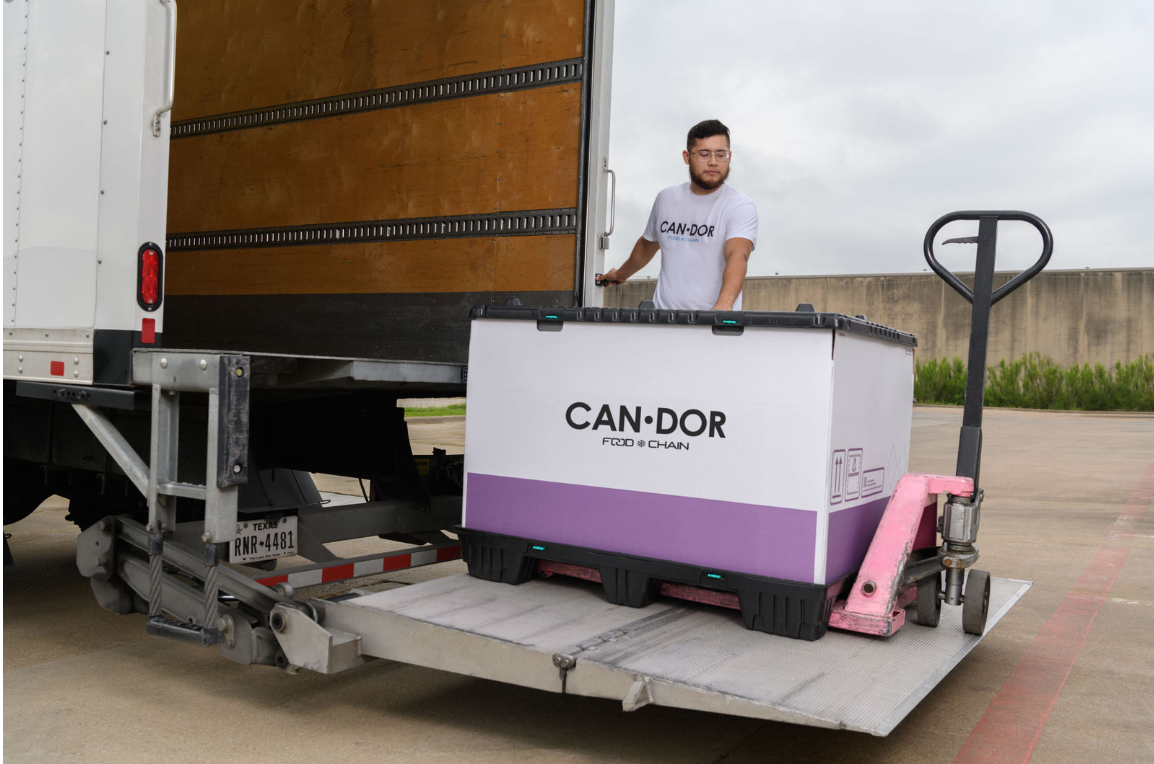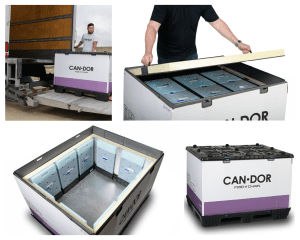


Candor Expedite (Candor) announced its expansion with the launch of a cold chain division, Candor Food Chain. Candor Food Chain combines the company’s national shipping services with a fully reusable cold packaging solution that allows pallet and box-sized frozen and refrigerated shipments to travel by regular transport and stay frozen or refrigerated for up to nine days. The company said it is the first US company to introduce this exclusive technology through a partnership with Cool Chain, a European technology provider who has been successfully working with pharmaceutical companies for more than a decade.
“I’ve witnessed the challenges shippers face in the frozen and refrigerated market. The excessive expenditure, along with issues like damaged products and delayed deliveries, is alarming,” said Nicole Glenn, founder and chief executive officer of Candor Expedite. “We’re excited to bring this new, unique technology to the food industry — reducing costs, eliminating claims, and offering real-time temperature and location monitoring.”
By consolidating deliveries of perishable and dry goods in one truck that supports three different temperatures — frozen, refrigerated, and ambient — food manufacturers, distributors, and retailers can eliminate the costs of multiple deliveries across the United States.
“Candor’s food chain pallets are equipped with a sturdy base and top to allow them to be double-stacked, maximizing load size,” said Glenn. “Temperature and GPS monitoring provide transparency and security for our clients. Many companies ship multi-temp trailers. However, most of them use partition walls that are powered by one unit and are often unreliable. Companies that are shipping multi-temp products often take on higher costs by using more than one truck for their products that are too sensitive for temperature fluctuation in such units.”
Candor’s food chain pallets can handle temperatures ranging from 10°F to 70°F (−12°C to 21°C). No dry ice is required since dry ice emits a dangerous carbon dioxide gas as it melts. Candor’s small boxes can hold a desired temperature for four days while the pallets can maintain conditions for nine days.
In addition to reducing carbon and refrigerant emissions, the boxes are reusable and contain no harmful toxins. They don’t require extra insulation and cardboard, which is often discarded after use. According to Candor, all boxes and pallets are 100% reusable. Candor covers all bases for the shipper/consignee from pick-up to delivery, followed by stringent cleaning and conditioning. There is always a logistics expert on hand to monitor any changes in the temperature and respond accordingly. Shippers can use any mode of transportation with Candor Food Chain’s packaging, including local distribution center, regional stores, and over-the-road capabilities.
“Our customers feel like heroes because they now have a way to cut out a large amount of wasted money, energy, and packaging while feeling good about meeting environmental goals,” said Tyler Wiard, director of business development of Candor Expedite and Candor Food Chain. “We’re a proud, woman-owned business which shippers appreciate as they strive to meet Diversity, Equity and Inclusion goals.”
Sustainably Minded Growth
Candor Food Chain believes its fully reusable cold packaging solution is having a meaningful and measurable impact on its customers’ shipping goals. “Cold chain is one of the fastest growing sectors in supply chain logistics,” said Glenn. “According to recent research, since 2019, frozen food sales have increased by 34%. The global cold chain logistics market is projected to grow from US$242.39 billion in 2021 to US$647.47 billion by 2028 at a compound annual growth rate of 15.1%. Reefer trucks are expensive to operate and have a large carbon footprint. While refrigerated warehouse capacity is growing, it’s expensive to develop and may struggle to keep up with demand. Time is also mission-critical in cold-chain logistics, especially for produce, thawing leads to food spoilage.”


Candor is currently in trials with some of the largest fast-food chains in the country. The company believes that two important trends will mark the next growth opportunity for the cold chain industry. The first is taking advantage of supply chain challenges and increased labor costs. “Shipping rates are likely to increase across the board,” said Glenn. “While the annual trend for spot rates is that they spike after the holidays, reefer rates [average cost to ship temperature-controlled freight in refrigerated vessels] will likely continue to outpace dry van and flatbed rates. Speculative development of cold storage facilities exploded from 300,000 sq.ft. [27,871 m2] to 3.3 million sq.ft. [306,580 m2] from 2019 to 2022. UPS is piling onto that trend, as evidenced by their push to open more temperature-controlled space for healthcare logistics. Nevertheless, public cold storage options are still strained, and shippers will need to devise alternatives if they want to avoid future bottlenecks. There’s also a warehouse labor shortage that makes it more difficult for shippers to plan ahead. Refrigerated shipments cannot just sit at a loading dock for hours or days on end awaiting the next shift to move it to cold storage. These are all indicators of an economic downturn in supply chain logistics. It sounds scary, but it presents an ideal window to strategically plan. Shippers will have more time to find the most affordable carrier options. There’s also more flexibility for shippers to identify transportation methods that require less time in cold storage carriers and facilities.”
The second trend that Candor plans to capture is cold chain custody accountability. “Cold chain custody will be a top priority for brands in the coming year,” said Glenn. “Cold chain logistics is heavily regulated, but it usually falls on shippers and consignees to self-police the regulations. Nevertheless, it’s essential to the mitigation of reputational risk that all players in the cold chain — shippers, carriers, and consignees — hold each other accountable. Competition is fierce during this economic downturn, which provides an opening for companies to raise expectations of their providers and partners. Shippers will require assurances that products be transported, stored, and distributed according to our refrigeration guidelines. Carriers will expect detailed refrigeration guidelines and cold chain custody compliance from the time they deliver the product. For consignees to sell/distribute a product, it must arrive under the promised refrigerated guidelines alongside a cold chain custody audit trail.”